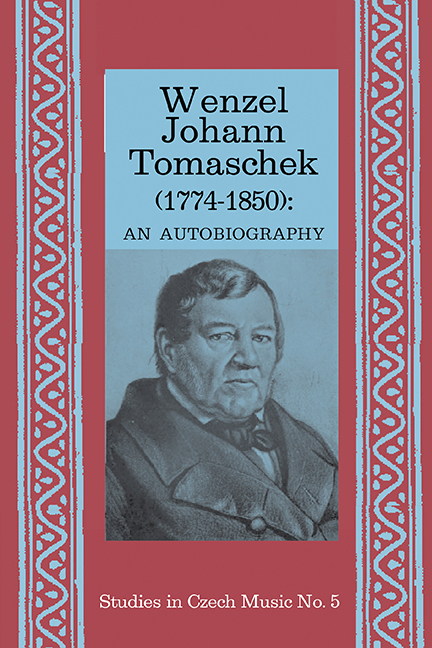Book contents
Chapter Twelve
Summary
Quite some time passed, before I could recover sufficiently from my mournful feelings after such a loss in order to once again be able to live for art. Five Lieder by Ebert, which I set for voice with pianoforte accompaniment, was the first thing that I composed, which soon appeared as op. 69 from Kronberger in Prague.
Chladni, the inventor of the Clavicylinder, and discoverer of the famous Klangfiguren, came to Prague, partly in order to let the instrument be heard, partly also in order to lecture on the Klangfiguren as well as on other acoustical phenomena. The instrument, certainly the novelty in the situation, which he had spoken about with uncommon perspicacity, so greatly piqued the interest of the residents of Prague that even women in great numbers were present at the ingenious presentations. If Chladni's personality, the organ, and his manner of presentation been in unity with the matters that he was discussing, then his lectures would certainly have produced a sensation heretofore unknown, but everything that he discussed lacked the allenlivening dramatic presentation. He was no more successful with his playing on the Clavicylinder; due to lack of the necessary technique he was no more than a bungler in his managing of the powerful, and yet lovely-sounding instrument. On my very first visit he asked me to try out his instrument. He turned the cylinder by means of a crank attached to it, and I played at will, enthused by the wonderful sound. He could not get over his amazement over such a rapid intimacy with the instrument, but as I explained to him, that my hands were accustomed to every sort of attack, which I had acquired only through long practice on the clavichord, the harpsichord, the pianoforte, and the organ, my relation to his instrument was the result of my variegated practicing, and as often as I visited him, he would not let me go until I had played him a fugue or a brilliant piece in the manner of the pianoforte; and in addition I had to promise him that I would let myself be heard on the Clavicylinder in one of his lectures, in order to show the audience what might be achieved on the instrument. I kept my word, by performing a fantasy extempore, which did not fail to make its effect.
- Type
- Chapter
- Information
- Wenzel Johann Tomaschek (1774–1850)Autobiography, pp. 117 - 130Publisher: Boydell & BrewerPrint publication year: 2017



